Resin-bound gravel stands as an eco-friendly paving choice for British homes and businesses, offering natural drainage whilst supporting the local environment. Its permeable structure handles our notorious UK rainfall efficiently, much like natural ground would. The system often incorporates recycled materials – from crushed glass to reclaimed aggregates – helping reduce waste in British landfills.
Think of it as a giant sponge for your driveway or garden path: water seeps through naturally, reducing puddles and surface flooding common in traditional concrete or tarmac surfaces. This drainage system proves particularly valuable in urban areas where water management is crucial.
The material’s green credentials extend to installation, using less energy-intensive methods than concrete laying. For homeowners concerned about planning regulations, resin-bound surfaces often meet local authority requirements for sustainable drainage systems (SuDS).
Key Takeaways
Five Key Environmental Benefits of Resin-Bound Gravel
1. Natural Water Management
Excellent for Britain’s rainy climate – allows rainwater to drain naturally through the surface, much like a garden lawn, reducing puddles and local flooding risks.
2. Natural Filtration System
Works like a giant filter, trapping harmful substances from cars and preventing them from reaching soil and waterways. Particularly useful in domestic driveways and car parks.
3. Waste Reduction
Made using recycled materials, including glass and aggregate from construction sites. A typical 50m² driveway can repurpose the equivalent of thousands of glass bottles.
4. Eco-Friendly Production
Uses less energy to produce than traditional concrete or asphalt surfaces. Manufacturing process creates fewer carbon emissions – about 40% less than standard paving methods.
5. Planning Compliant
Meets UK sustainable drainage regulations (SuDS), making it ideal for new builds and renovations where planning permission requires eco-friendly drainage solutions.
Understanding Resin-Bound Gravel
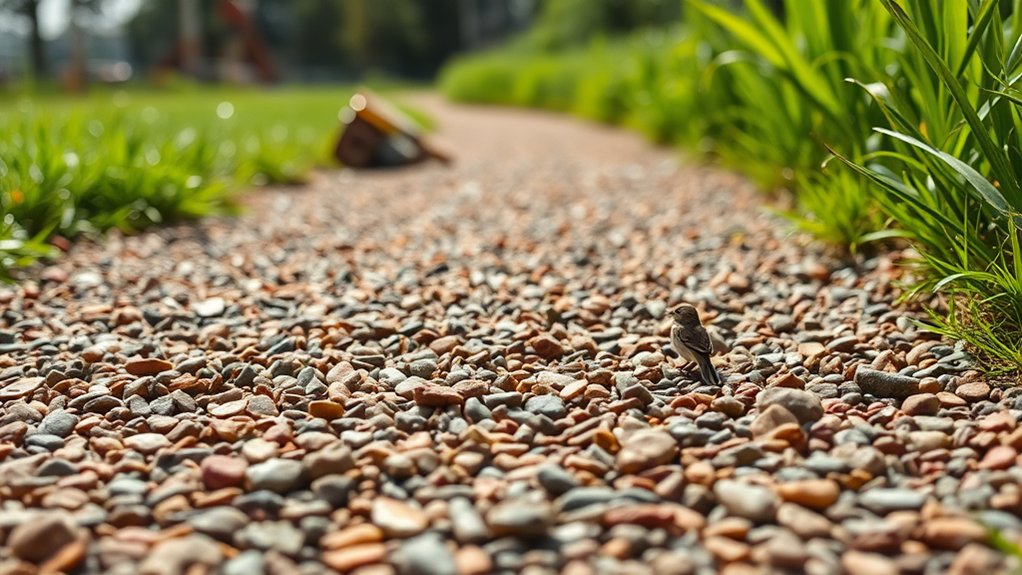
Resin-bound gravel offers a modern, practical solution for outdoor surfaces, combining stone aggregates with specialist resin to create a tough, water-permeable finish.
The right resin is crucial – UV-stable and flexible types work best for British weather conditions. You can choose from several aggregates, from standard gravel to marble chips, depending on your preferred look and budget.
Installation requires thorough mixing of the materials in a forced action mixer, much like mixing concrete but with more precision. A solid concrete or tarmac base is essential – skimp on this, and you’ll regret it later. This surface also supports natural filtration, which helps maintain cleaner waterways and benefits local ecosystems.
The finished surface, laid at 12-24mm thick, provides excellent grip even in wet weather and allows rainwater to drain through naturally, helping prevent puddles on your drive or patio. This type of surfacing is also designed to manage heavy rainfall, making it an ideal choice for areas prone to flooding.
This type of surfacing has become increasingly popular across the UK, particularly for driveways where councils require sustainable drainage solutions.
Think of it as a premium alternative to loose gravel, offering the same attractive finish but without the mess of scattered stones.
Environmental Benefits of Resin-Bound Surfaces
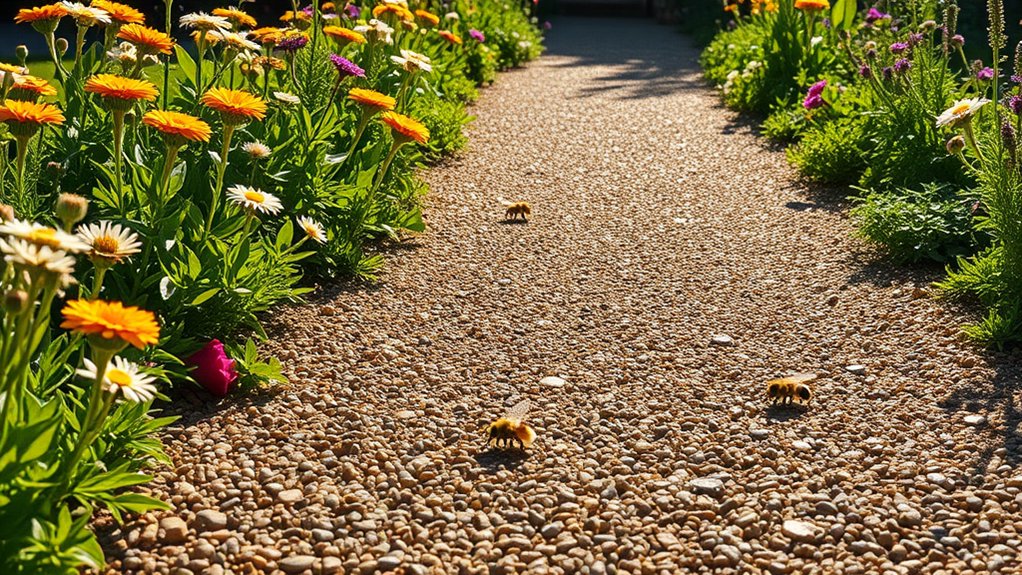
Resin-bound surfaces deliver key environmental advantages for British homes and developments.
Their permeable nature lets rainwater soak through naturally, cutting flood risks in our often-wet climate. Additionally, they support Sustainable Urban Drainage Systems that align with local council initiatives, further enhancing water management capabilities. The material acts as a natural filter, preventing debris from clogging sewers and improving overall drainage efficiency.
Using stones and aggregates from local quarries reduces transport emissions and supports UK businesses.
These surfaces work particularly well in British gardens and driveways, where they help manage our frequent rainfall whilst maintaining an attractive finish.
Unlike traditional concrete or tarmac, they create better drainage systems that work with nature rather than against it.
Permeability and Flood Prevention
Resin-bound gravel is a highly effective solution for flood prevention in UK towns and cities. The material’s porous nature allows rainwater to drain through naturally, much like a garden lawn. With depths of 20mm for driveways and 16mm for pathways, it efficiently prevents puddles and surface flooding during Britain’s frequent downpours.
Unlike traditional tarmac or concrete, which cause water to pool and overwhelm drains, resin-bound surfaces let rain filter through to the ground below. This significantly reduces the strain on local drainage systems, particularly during heavy storms. Think of it as a built-in drainage system that works round the clock. The high permeability of resin-bound systems enhances groundwater infiltration and mitigates standing water. Additionally, these surfaces support Sustainable Urban Drainage Systems that help alleviate pressure on local infrastructure.
The surface remains strong enough for cars and foot traffic whilst maintaining its water-managing properties. A quick vacuum every few months keeps the system working properly – rather like maintaining your home gutters.
For British homeowners looking to tackle flooding whilst keeping their property accessible, resin-bound gravel offers a practical, long-lasting solution.
Ecosystem Support and Harmony
The porous structure of resin-bound gravel works brilliantly for flood prevention whilst supporting our local wildlife.
Its practical design strengthens natural habitats and helps creatures move freely between green spaces.
Three stand-out environmental benefits:
- Better Biodiversity: Natural water seepage keeps soil properly moist, helping local plants and animals thrive whilst stopping soil washing away.
- Less Pollution: The surface acts like a natural filter, catching nasty bits before they reach our streams and ponds, protecting fish and water life.
- Natural Look: The gravel blends perfectly with garden landscapes, supporting native plants that create perfect spots for British wildlife to flourish.
Sustainable Material Sourcing
Sustainable materials are vital for eco-friendly surfaces, with resin-bound gravel being a prime example. The system makes excellent use of recycled materials, including crushed glass and natural stone aggregates from local sources, which cuts down on landfill waste and reduces the demand for new raw materials. This practical approach benefits both the environment and local UK businesses.
| Material Type | Environmental Benefit | Local Impact |
|---|---|---|
| Recycled Aggregates | Reduces landfill waste | Supports local waste management |
| Natural Stone | Minimises transportation emissions | Strengthens regional economies |
| Crushed Glass | Contributes to circular economy | Utilises local construction waste |
| Permeable Surfaces | Reduces urban heat island effect | Enhances local ecosystem health |
The use of recycled materials in UK construction projects has become increasingly important, particularly in urban areas where waste management is a pressing concern. For instance, crushed glass from local building sites can be effectively repurposed into attractive, durable surfaces, whilst supporting community recycling initiatives.
Sustainability Features of Resin Paving
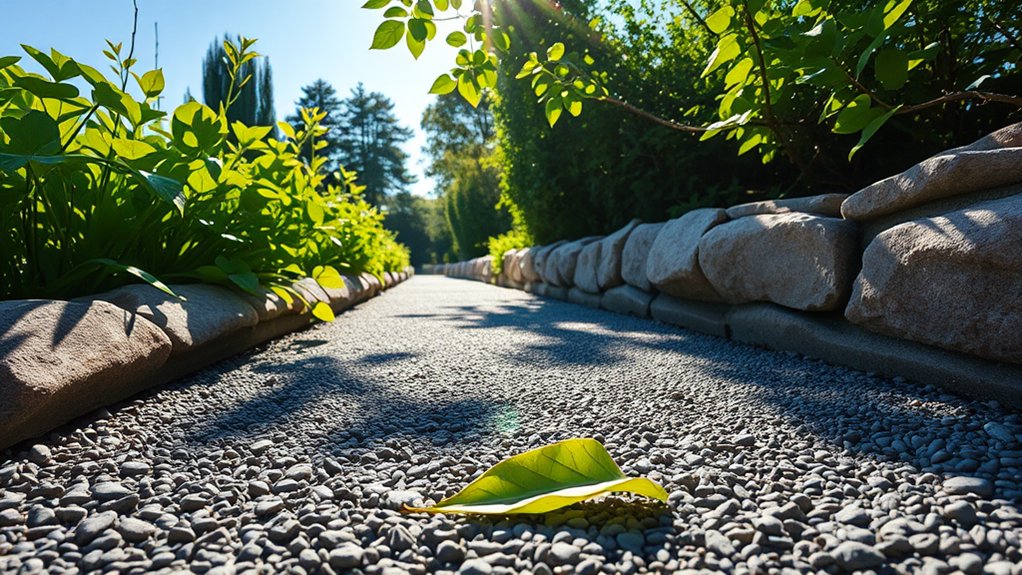
Resin paving stands out as an environmentally sound choice for UK homeowners and builders. The system uses recycled materials, including glass and aggregate, keeping waste out of British landfills.
UK manufacturers employ low-carbon production methods, whilst the finished surface helps reduce flooding through natural water drainage. This sustainable approach makes resin paving a practical choice for driveways, paths and patios across Britain, supporting local efforts towards greener construction practices.
Recycled Material Utilization
Recycled materials in resin-bound gravel make it a more sustainable choice whilst reducing the need for new raw materials. The use of recycled aggregates brings several key environmental advantages:
- Less Waste in Landfills: Reusing materials keeps tonnes of waste out of UK landfill sites, which are already under pressure.
- Protects Our Resources: Cuts down on quarrying across British landscapes, preserving local environments.
- Creates a Recycling Cycle: Once the surface reaches the end of its life, it can be recycled again into new materials.
This approach is particularly relevant as British construction firms face increasing pressure to adopt greener practices. Common recycled materials include crushed glass and reclaimed stone, which perform just as well as virgin materials.
Low Carbon Manufacturing
The rise in eco-friendly construction has made low-carbon resin-bound gravel manufacturing a standout choice in the UK building sector. Unlike traditional concrete and tarmac, this process uses far less energy and produces fewer emissions. The manufacturing doesn’t use fossil fuels, making it particularly green.
Using local stones and aggregates keeps transport emissions down whilst supporting British suppliers. The process creates minimal waste, and the cold-mixing method means less energy use during installation. Quick application times also mean less labour on site.
For builders and homeowners looking to reduce their carbon footprint, resin-bound gravel offers a practical alternative to conventional materials. Its environmental benefits, combined with durability and performance, make it an increasingly popular choice for British construction projects.
Installation Process and Durability
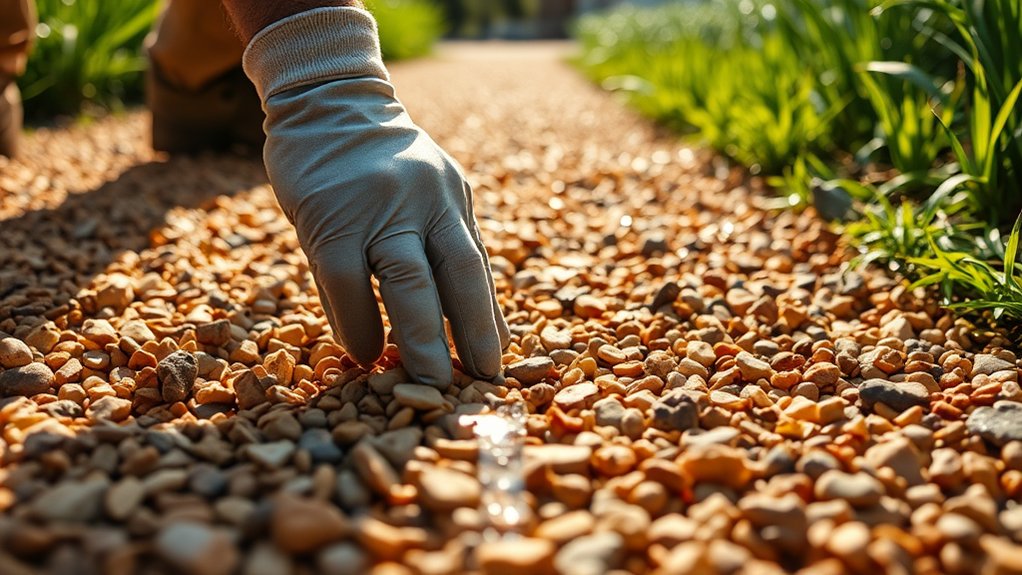
Installing Resin-Bound Gravel: Process and Durability
A proper resin-bound gravel installation ensures a long-lasting, durable surface for your driveway or garden path. The process requires three key steps:
- Surface Prep: Clean and level the area thoroughly. Much like painting a wall, fill any cracks or holes – even small defects can compromise the final result.
- Mixing: Combine resin and aggregate in a forced-action mixer, following exact manufacturer ratios. Think of it like baking – precise measurements matter for the best outcome.
- Curing: Leave the surface untouched for 24 hours minimum. The British weather can affect curing times – longer in cold or damp conditions.
Pro tip: Whilst DIY is possible, professional installation often proves more cost-effective, especially for larger areas.
Energy and Resource Consumption
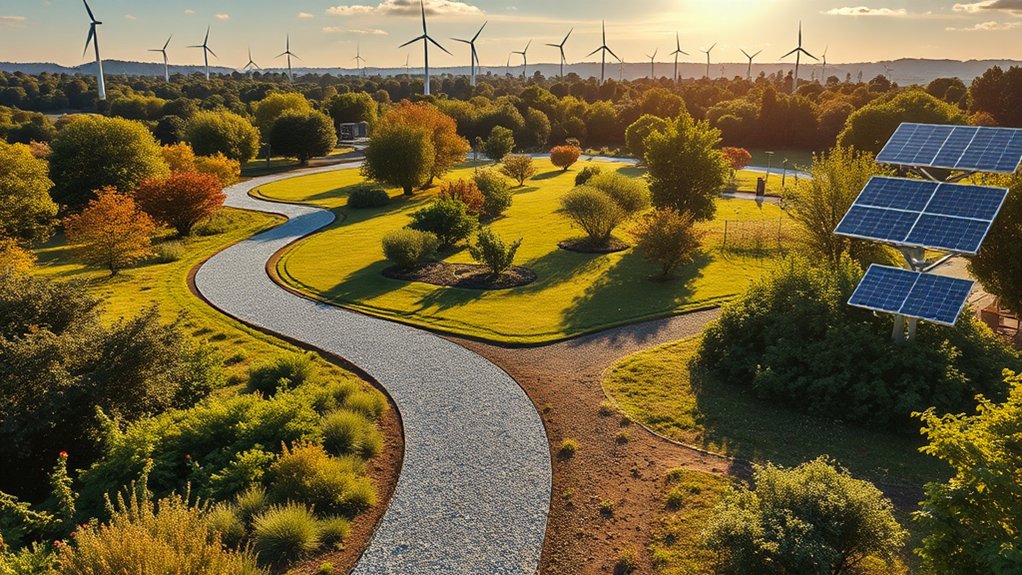
Resource-efficient resin-bound gravel needs less energy for upkeep than standard paving options like concrete or tarmac.
Natural stone aggregates used in the mixture prove more environmentally sound than man-made materials, requiring fewer resources to produce and maintain.
These practical benefits make resin-bound surfaces a sensible choice for anyone keen on reducing their environmental impact whilst maintaining a durable, attractive driveway or path.
Lower Energy Requirements
Lower Energy Requirements
Resin-bound gravel installation uses far less energy than traditional paving methods. Three key factors make it particularly efficient:
- Cold-Mixing Technique: No heat needed during mixing, which cuts energy use significantly – much like mixing concrete at room temperature.
- Quick Application Process: The job gets done faster than conventional paving, using fewer work hours and less machinery time.
- Minimal Transport: Modern equipment like the EcoBatcher means fewer lorry journeys to and from site.
Together, these features make resin-bound gravel a more sustainable choice.
You’ll spend less on energy both during installation and ongoing maintenance, making it a practical, eco-friendly option for driveways, paths and patios.
Resource Conservation Benefits
Resin-bound gravel delivers strong resource conservation benefits through its clever use of recycled materials.
Using up to 80% recycled content, including crushed glass and plastics, it cuts the need for new raw materials whilst improving sustainability.
Its modular structure means damaged sections can be fixed without replacing the entire surface, reducing waste.
Sourcing materials locally cuts transport costs and carbon emissions whilst supporting British businesses.
The surface lasts longer than traditional options, meaning fewer repairs and replacements over time.
This approach keeps materials in use and out of landfills, supporting the UK’s move towards a circular economy.
The system proves particularly effective for British driveways and paths, where durability and sustainability are key priorities.
Addressing the Urban Heat Island Effect
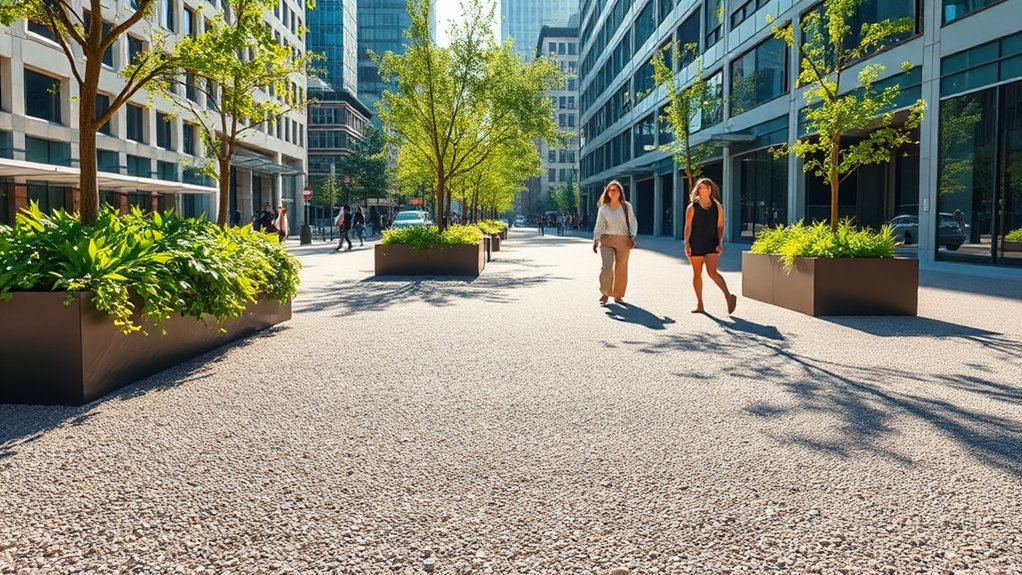
Urban Heat Island (UHI) Effect: A Guide to Cooling Our Cities
British cities face rising temperatures as concrete and tarmac replace natural surfaces. This creates a heat trap – much like leaving your car in a sunny car park – where urban areas become notably warmer than nearby countryside.
Three practical solutions to tackle UHI:
1. Urban Greenways
Create connected green spaces throughout cities, similar to London’s Green Corridor. These natural networks cool the air whilst providing pleasant walking and cycling routes.
2. Cool Pavement
Switch dark surfaces to lighter materials, like those used in Brighton’s New Road. These reflect rather than absorb heat, keeping surrounding areas cooler and cutting energy costs.
3. Tree Planting
Plant more street trees, following Manchester’s City of Trees initiative. A mature oak or London plane tree can cool an area as effectively as ten air-conditioning units.
These measures work best when combined, as demonstrated in projects across Birmingham and Sheffield where temperatures dropped by up to 3°C in treated areas.
Regulatory Compliance and Environmental Standards
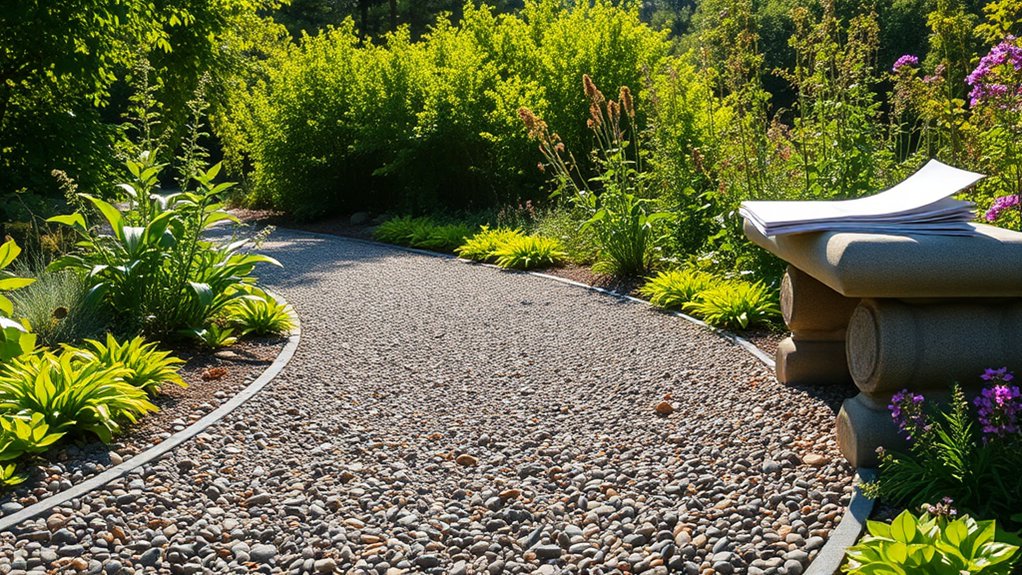
Navigating regulatory compliance and environmental standards in urban construction requires careful attention to both legal requirements and sustainability practices.
The construction industry faces strict regulations, particularly for materials like resin-bound gravel. REACH regulations now require proper certification for installers handling chemical compounds, with mandatory training requirements taking effect from 24 August 2023.
Key compliance areas include SUDS (Sustainable Urban Drainage Systems) regulations, which ensure proper water drainage and flood prevention. For example, permeable paving must meet specific water absorption rates to gain approval for new developments.
UK and EU standards encourage the use of environmentally friendly materials, such as recycled aggregates and low-emission resins.
Regular site audits and staff training help maintain these standards whilst reducing environmental impact. This practical approach helps builders meet both legal obligations and growing market demand for sustainable construction methods.
The Role of Permeability in Stormwater Management
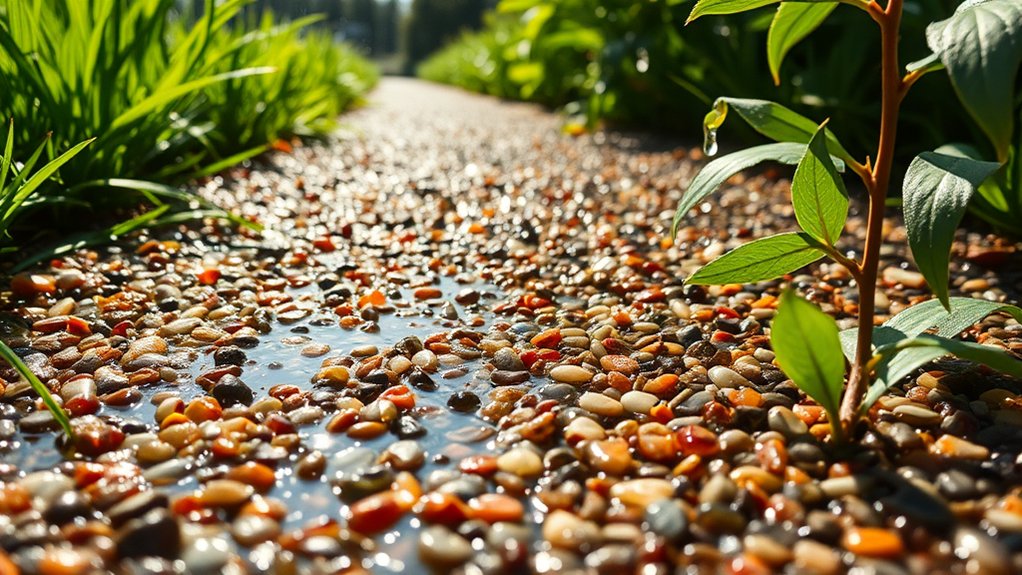
The Impact of Permeability on Managing Rainwater
Permeability is crucial for effective rainwater management, allowing water to soak through surfaces rather than overwhelm drains. This natural filtering process brings several key advantages:
- Lower Flooding Risk: Picture a car park with permeable surfaces – during heavy rain, water seeps through rather than pooling, which takes pressure off local drains and sewers.
- Natural Water Table Top-up: Just as a garden lawn allows rain to reach plant roots, permeable surfaces help replenish underground water supplies naturally.
- Less Surface Water: By reducing the amount of water rushing across surfaces during storms, permeable materials help prevent localised flooding – particularly useful in built-up areas where conventional drainage might struggle.
These benefits are especially relevant for British weather patterns, where frequent rainfall can challenge traditional drainage systems.
Enhancing Local Ecosystems With Resin-Bound Gravel
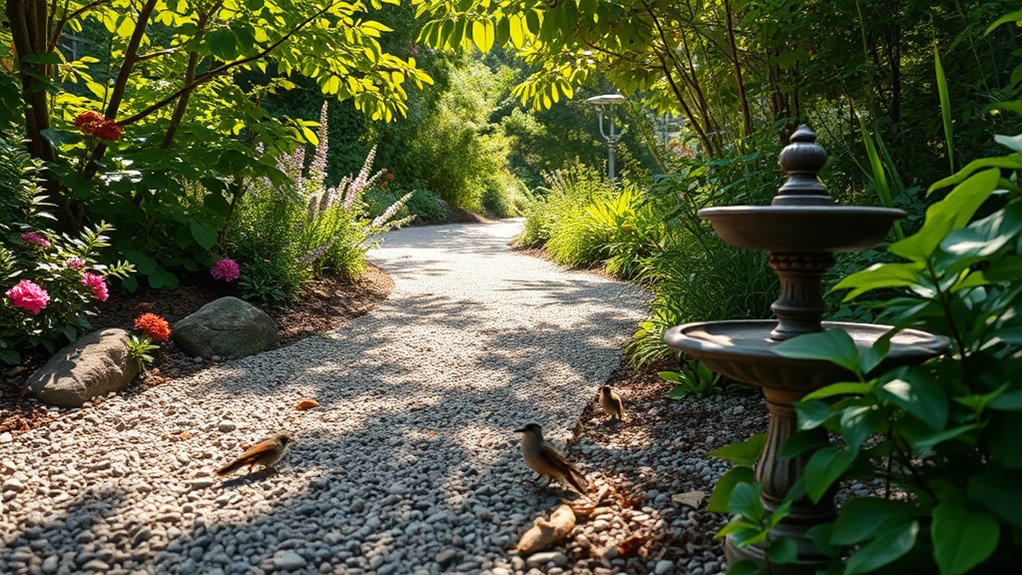
Resin-bound gravel offers a unique way to protect local ecosystems whilst providing practical outdoor surfacing. Unlike traditional paving, this permeable solution lets rainwater soak through naturally, supporting nearby plants and wildlife.
Think of it as a natural filter – it helps clean water as it passes through, much like a coffee filter, before it reaches the soil below.
The surface creates vital corridors for urban wildlife, allowing hedgehogs and other creatures to move safely between gardens and green spaces. It’s particularly useful in British gardens and driveways, where heavy rainfall can often lead to flooding issues.
Built to last, resin-bound gravel needs minimal upkeep and won’t require replacing as often as conventional paving. This means less waste and fewer maintenance products entering the soil.
For homeowners looking to balance practicality with environmental responsibility, it’s a sound investment that helps rather than harms local wildlife.
The system works brilliantly in UK conditions, managing everything from summer downpours to winter frost without cracking or lifting.
It’s an increasingly popular choice for those wanting to create eco-friendly driveways and garden paths whilst maintaining a smart appearance.
Future Trends in Resin-Bound Paving Solutions
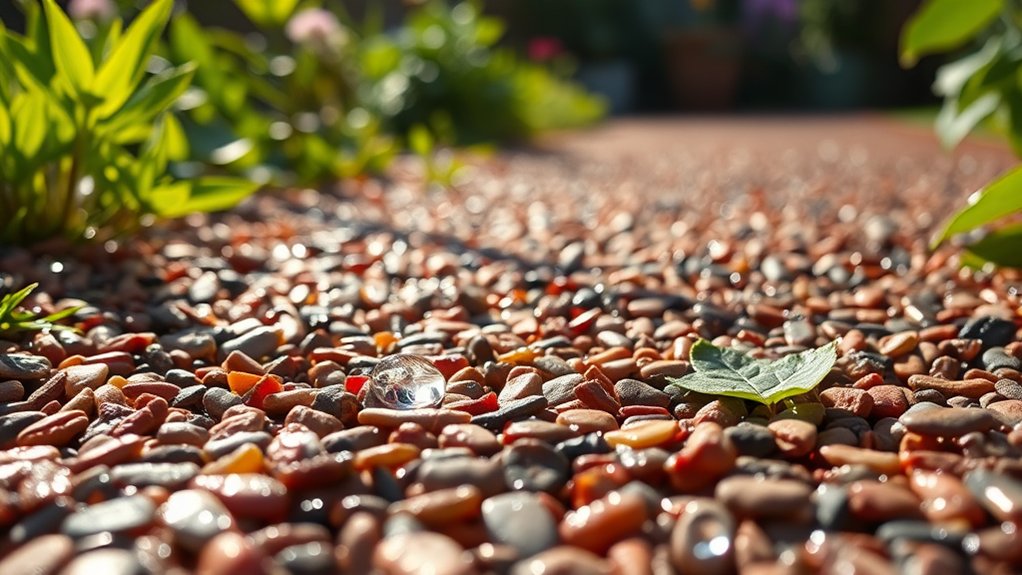
Future Trends in Resin-Bound Paving Solutions
The UK’s construction sector is seeing growing demand for eco-friendly paving, with resin-bound solutions leading the charge.
Three key trends are shaping the market:
- Sustainable Materials: British contractors are increasingly using recycled glass and local aggregates mixed with plant-based resins. These materials perform just as well as traditional options whilst reducing landfill waste.
- Customisation Options: Property owners now want more than standard grey or brown finishes. Think contemporary metallics for modern homes or heritage colours to complement Victorian architecture.
- Technological Advancements: New-generation resins developed in UK laboratories offer better weather resistance – crucial for our rainy climate – and faster curing times, meaning less disruption during installation.
These changes reflect both stricter UK building regulations and growing environmental awareness, making resin-bound paving a practical choice for British driveways, paths and public spaces.
Frequently Asked Questions
How Does Resin-Bound Gravel Compare to Traditional Paving Materials?
Resin-bound gravel stands out amongst traditional British paving choices, offering better drainage and requiring less upkeep than concrete or tarmac. The straightforward laying process bonds stone and resin to create a robust surface that looks smart for years – perfect for driveways and garden paths across the UK. Unlike block paving, it won’t develop weeds between joints or suffer from loose stones, making it a practical choice for British weather conditions.
Can Resin-Bound Gravel Be Easily Repaired if Damaged?
Resin-bound gravel surfaces can be fixed with minimal fuss. For small cracks, you’ll need to widen them slightly before applying a matching resin filler – much like filling a crack in a wall. For the best results, check your surface every few months, particularly after harsh weather. Quick repairs and regular once-overs will keep your driveway or path looking smart and prevent costly damage down the line.
What Colors and Textures Are Available for Resin-Bound Surfaces?
Resin-bound surfaces come in a wide range of colours, from natural stone tones to vibrant reds and golds. Common finishes include smooth, anti-slip and textured surfaces, making them suitable for both driveways and garden paths. Popular choices amongst UK homeowners include grey granite, warm honey and classic Thames blend.
How Do Weather Conditions Affect Resin-Bound Gravel Installations?
Weather significantly impacts resin-bound gravel installations in the UK. Rain and moisture prevent proper curing, whilst extreme temperatures can affect the resin’s setting properties. Best results occur in dry conditions between 5-25°C. Heavy rain before installation can leave the ground too wet, and frost or intense summer heat may compromise the finish. A stable forecast for 6-8 hours post-installation is essential for optimal results.
Is Resin-Bound Gravel Suitable for All Climates?
Resin-bound gravel works well in most British weather conditions, though you’ll need to be careful about when you install it. Whilst it handles our typical rain and cold spells admirably, it’s best to avoid laying it during particularly hot or humid days. Think of it like painting a fence – you wouldn’t do it in the pouring rain or on the hottest day of summer. Once properly installed, it’ll cope just fine with our varied climate year-round.
Conclusion
The evidence clearly shows that resin-bound gravel offers a practical solution for sustainable paving in the UK. Its permeable nature helps manage our frequent rainfall, reducing localised flooding and supporting nearby plant life. Much like traditional garden soils, these surfaces allow water to filter naturally into the ground, benefiting both the environment and your property. When properly installed, resin-bound surfaces prove remarkably durable whilst maintaining their eco-friendly qualities, making them a sensible investment for British homeowners and businesses focused on environmental responsibility.
